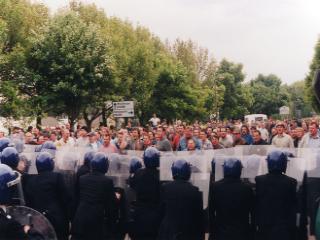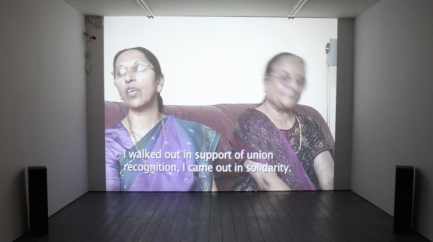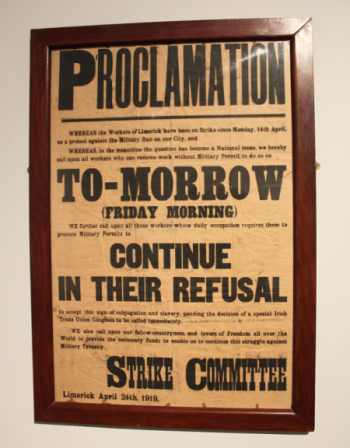
STRIKE!
24 January- 15 March 2013
Limerick City Gallery of Art
STRIKE!
As Ireland turns further into its Decade of Commemorations, Limerick City Gallery of Art presents STRIKE!, an exhibition exploring industrial disputes and workers resistance including the occurrence of Limerick’s extraordinarySOVIET, with material from Limerick City Museum, exploring the strike protest that existed in Limerick and 'excited world attention' in April 1919. STRIKE! presents the Battle of Orgreave (an injury to one is an injury to all) by Jeremy Deller, directed by Mike Figgis, co-commissioned by Artangel and Channel 4.
In a series of Films curated by Anthony Haughey,a wide range of response to industrial unrest, across many countries from Ireland to Argentina
The list of Films on show include:
-
STRIKE Sergei Eisenstein (94 minutes)
-
Dole not Coal COMPRESS Media (135 minutes)
-
Harlan County USA - Barbara Kopple (105 minutes)
-
Salt of the Earth Herbert J. Biberman (94 minutes)
-
The Take Avi Lewis & Naomi Klein (87 minutes)
-
The Great Grunwick Strike Brent Trades Council (64 minutes)
-
Stand Together Brent Trades Council (52 minutes)
-
Look back at Grunwick Brent Trades Council (26 minutes)
-
The Globalisation Tapes Vision Machine Project (70 minutes)
-
The GAMA Strike (60 minutes)
-
The Forgotten Space Allan Sekula (116 minutes)
The following films will be screened on dates to be confirmed, with guest speakers attending:
-
Modern Times Charles Chaplin (87 minutes)
-
161 Days Declan O Connell (45 minutes)
Screening events listed in Event & Lectures section on web site


The Head Quarters Project calls on members of the community to contribute to a collective unearthing of buried memory of Limerick’s Soviet.
These explorations begin LCGA’s year-long presentation of the notions of Labour and Work in today’s world, with exhibitions throughout the year, drawing from the centenary of Dublin’s 1913 Lockout. It is, at the very least poignant, that this exhibition opens as workers from HMV concluded a sit-in for their rights and entitlements as workers, with many others realising the instability and problematic nature of working in Ireland and Europe today.


